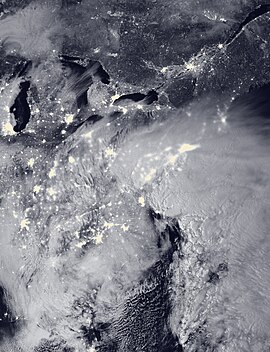January 2016 United States blizzard
| Category 5 "Extreme" (RSI: 20.14) | |

The intensifying extratropical cyclone responsible for the blizzard over the eastern United States at 2:15 a.m. EST (07:15 UTC) on January 23, 2016.
|
|
| Type |
Extratropical cyclone Nor'easter Winter storm Ice storm Blizzard |
|---|---|
| Formed | January 19, 2016 |
| Dissipated | January 29, 2016 |
| Lowest pressure | 983 mb (29.03 inHg) |
| Tornadoes confirmed | 6 on January 21 |
| Max rating1 | EF2 tornado |
| Duration of tornado outbreak2 | 2 hours, 42 minutes |
| Highest winds |
|
| Highest gust | 85 mph (137 km/h) |
| Maximum snowfall or ice accretion | Snow – 66 inches (170 cm) on Mount Mitchell, North Carolina Ice – At least 0.75 in (19 mm) in western North Carolina |
| Damage | $500 million – $3 billion in economic losses |
| Power outages | 631,000+ people affected |
| Casualties | 55 fatalities |
| Areas affected | Pacific Northwest, Great Plains, South Central United States, Eastern United States (especially the Mid-Atlantic states), Atlantic Canada, British Isles, Finland |
|
1Most severe tornado damage; see Enhanced Fujita scale 2Time from first tornado to last tornado Part of the 2015–16 North American winter |
|
1Most severe tornado damage; see Enhanced Fujita scale 2Time from first tornado to last tornado
The January 2016 United States blizzard was a crippling and historic blizzard that produced up to 3 ft (91 cm) of snow in parts of the Mid-Atlantic and Northeast United States from January 22 to January 24, 2016. Evolving from a shortwave trough that formed in the Pacific Northwest on January 19, the system consolidated into a defined low-pressure area on January 21 over Texas. Regarding it as a "potentially historic blizzard", meteorologists indicated the storm could produce more than 2 ft (61 cm) of snow across a wide swath of the Mid-Atlantic region and could "paralyze the eastern third of the nation". Winter weather expert Paul Kocin described the blizzard as "kind of a top-10 snowstorm".
On January 20–22, the governors of eleven states and the mayor of Washington, D.C. declared a state of emergency in anticipation of significant snowfall and blizzard conditions. Approximately 103 million people were affected by the storm, with 33 million people under blizzard warnings. More than 13,000 flights were cancelled in relation to the storm, with effects rippling internationally. Thousands of National Guardsmen were placed on standby and states deployed millions of gallons of brine and thousands of tons of road salt to lessen the storm's effect on roadways. A travel ban was instituted for New York City and Newark, New Jersey for January 23–24. The storm was given various unofficial names, including Winter Storm Jonas and Snowzilla.
...
Wikipedia
